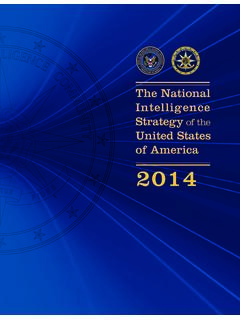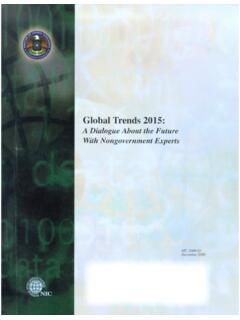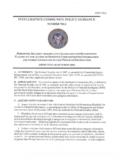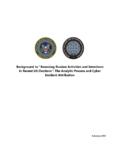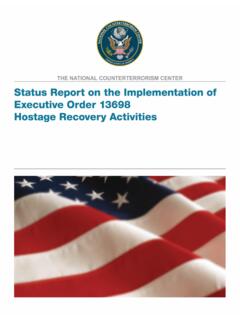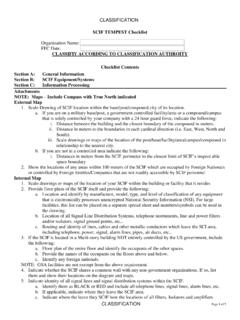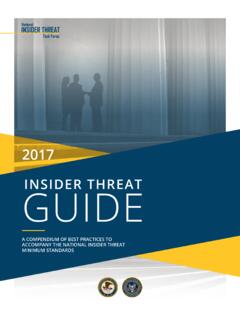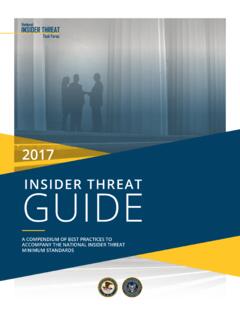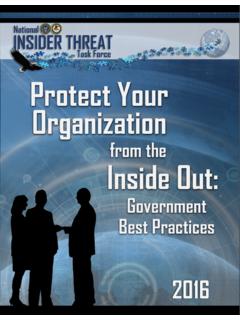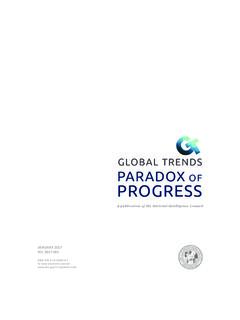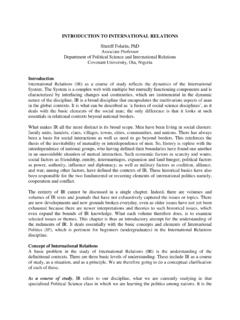Transcription of Nonstate Actors: Impact on International Relations and ...
1 This Thispaper paperdoes doesnot notrepresent representUS. USGovernment Governmentviews views Nonstate Actors: Impact on International Relations and Implications for the United States Key Points Participants in a series of NIC-Eurasia Group seminars in late 2006 and early 2007. discussed how the proliferation in recent years of Nonstate actors primarily multinational corporations, non-governmental organizations, and super-empowered individuals is transforming International Relations . A globalization-fueled diffusion of finance and technology has enabled Nonstate actors to encroach upon functions traditionally performed by nation-states, facilitating their evolution into forms unheard of even a few years ago.
2 For example, philanthrocapitalist charities such as the Gates Foundation have greatly expanded notions of what a charitable NGO should look like. Estimates of their Impact should be made cautiously, however, for few Nonstate actors are completely independent of nation-states, and they do not have uniform freedom of movement. Although Nonstate actors have a great deal of latitude in both weak and post-industrial states, modernizing states such as China and Russia home to the bulk of the world's population have been highly effective in suppressing them and in creating their own substitutes, some of which have demonstrated their power to counter US objectives and even to challenge global rules of engagement.
3 Most benign Nonstate actors originate in the developed world, work within the framework provided by Western institutions and regimes, and act as propagators of western values such as free markets, environmental protection, and human rights. From that standpoint, a key concern for the United States may be not that these actors have become too powerful, but that in many parts of the world their influence is limited a factor that is contributing to the tilting of the global playing field away from the United States and its developed-world allies. This report was prepared under the auspices of the National Intelligence Officer DR-2007-16D.
4 For Economics and Global Issues. 23 August 2007. 1. This paper does not represent US Government views This paper does not represent US Government views Introduction The National Intelligence Council and Eurasia Group co-hosted a series of four seminars in late 2006 and early 2007 on The Role of Nonstate Actors in International Politics. These sessions examined a wide range of such actors (including terrorists and International criminals), but their primary focus was on non-criminal Nonstate actors: multinational corporations, NGOs (non- governmental organizations), and philanthropic super-empowered individuals. These entities were chosen because they have International clout, but are often overlooked in geopolitical analysis as they do not pose explicit security threats to the United States.
5 A Note on Terminology Nonstate actors are non-sovereign entities that exercise significant economic, political, or social power and influence at a national, and in some cases International , level. There is no consensus on the members of this category, and some definitions include trade unions, community organizations, religious institutions, ethnic groupings, and universities in addition to the players outlined above. The bulk of the NIC-Eurasia Group discussions centered on organizations and individuals which are truly Nonstate , or which perform functions not typically associated with national governments in advanced Western economies: multinational corporations are enterprises that manage production or deliver services in at least two countries.
6 The traditional multinational is a private company headquartered in one country and with subsidiaries in others, all operating in accordance with a coordinated global strategy to win market share and achieve cost efficiencies. A significant portion of the discussion, however, centered on the relatively recent multinationalization of state-owned enterprises such as Russia's arms-export monopoly Rosonboronexport or Chinese oil company CNPC, which as state entities may or may not share the same incentives and goals as their private counterparts. NGOs (nongovernmental organizations) are organizations that are private, self-governing, voluntary, non- profit, and task- or interest-oriented advocacy organizations.
7 Within those broad parameters there is a huge degree of diversity in terms of unifying principles; independence from government, big-business, and other outside influences; operating procedures; sources of funding; International reach; and size. They can implement projects, provide services, defend or promote specific causes, or seek to influence policy. Discussion briefly touched on the contradiction-in-terms Government Operated NGO (GONGO), which may be set up by governments to garner aid money or promote government interests. Super-empowered individuals persons who have overcome constraints, conventions, and rules to wield unique political, economic, intellectual, or cultural influence over the course of human events generated the most wide-ranging discussion.
8 Archetypes include industrialists, criminals, financiers, media moguls, celebrity activists, religious leaders, and terrorists. The ways in which they exert their influence (money, moral authority, expertise) are as varied as their fields of endeavor. As bounded by seminar participants, this category excludes political office holders (although some super-empowered individuals eventually attain political office), those with hereditary power, or the merely rich or famous. There are far more shared interests between NGOs and super-empowered individuals (driven by normative agendas) than between either of them and multinationals (driven by a quest for profit and growth).
9 At the same time they do not exist in isolation from each other; for example, NGOs may censure, lobby, or advise multinational corporations and super-empowered individuals may head a multinational or an NGO. 2. This paper does not represent US Government views This paper does not represent US Government views What is New About Nonstate Actors? Influential Nonstate actors are not a new phenomenon: the Hanseatic League monopolized trade on the Baltic Sea between the 13th and 17th centuries, the highly powerful East India Company was founded in 1600, European haute finance was a major contributor to the relative peace of the 19th century, and the Red Cross dates to the 1860s.
10 What differentiates and shapes contemporary Nonstate actors, however, is an unprecedented operating environment. The end of the Cold War meant that military and security issues no longer automatically dominated the economic and social ones that are the benign Nonstate actors' stock-in-trade; globalization has made financial, political, and technical resources more widely available (and constrained the developed world's ability to make the rules); and technology and the growth of a global popular culture provide new opportunities for rallying support and getting messages across. For multinational corporations, the most important change is the breaking down of the old model of multinationals headquartered in developed countries, with subsidiaries in the developing world taking orders from them.
